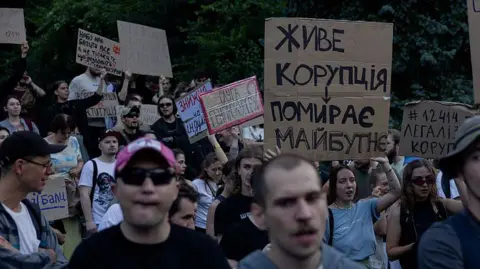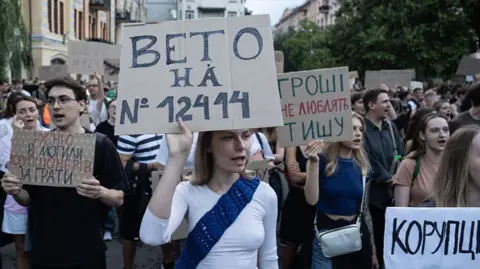 Getty Images
Getty ImagesUkraine’s government is facing a growing backlash after President Volodymyr Zelensky signed a law limiting the independence of two anti-corruption agencies.
The contentious bill grants control of the National Anti-Corruption Bureau (Nabu) and Specialised Anti-Corruption Prosecutor’s Office (Sap) to the prosecutor general, who is appointed by the president.
Zelensky argued provisions needed to be taken as Nabu and Sap were letting criminal proceedings stagnate for years and insisted they had to be “cleansed from Russian influence”.
He signed the bill into law late on Tuesday after it received the backing of 263 MPs out of 324.
Many Ukrainians outside parliament – the Rada – disagree with the decision. Critics say the law will severely undermine the Nabu and Sap’s authority and effectiveness.
On Tuesday night thousands gathered outside the president’s office in Kyiv to protest.
Smaller rallies were also held in Odesa, Dnipro, Lviv and Sumy – despite the continued threat from nightly Russian aerial attacks. The gatherings were the first anti-government demonstrations since Moscow launched its full-scale invasion of Ukraine in 2022.
The fight against corruption is seen as closely tied to Kyiv’s prospects for integration within the EU – a path that started in 2014, when anti-government protests ousted pro-Russian President Viktor Yankuovych in favour of closer ties with the West.
The creation of Nabu and Sap was one of the requirements set by the European Commission and International Monetary Fund more than a decade ago in order to move towards a relaxation of visa restrictions between Ukraine and the EU.
In 2022, Kyiv was granted the coveted status of EU candidate – a significant development that boosted spirits and strengthened ties between Ukraine and its European backers.
Now, there is concern Zelensky’s move may undermine Kyiv’s growing proximity to the West – a cause for which many Ukrainians feel their country continues to pay the price of the Russian onslaught. “Corruption lives – the future dies,” one placard at the Kyiv protest read.
 Getty Images
Getty ImagesGraft in Ukraine is endemic and the country currently ranks 105 out of 180 in Transparency International’s Corruption Perceptions Index. The rating may be low – but it nonetheless marks an improvement of 39 points since Nabu and Sap were created in 2014.
Since then the two bodies have been involved in far-reaching investigations into the misappropriation of millions of dollars’ worth of assets and bribes across various ministries and sectors.
In 2023 a joint investigation resulted in the arrest of the head of Ukraine’s Supreme Court, Vsevolod Kniaziev, in connection with a $3m (£2.4m; €2.9m) bribe. Earlier this month, it also emerged Nabu was conducting searches at the residence of former defence minister Oleksii Reznikov.
Now Nabu and Sap will have to operate under presidential oversight, leading some to wonder whether high-profile figures close to the government will eschew scrutiny. By curtailing the bodies’ independence the government had “destroyed everything that has been worked on for years,” one protester in Kyiv told Radio Liberty.
Despite a nationwide ban on mass gatherings under martial law, more protests were expected in an even greater number of cities across Ukraine on Wednesday evening.
The “scandalous” law passed on Tuesday “dealt a critical blow to Ukraine’s European integration process,” the Ukrainska Pravda website said, while another outlet, Dzerkalo Tyzhnia, warned that Zelensky had taken a “step towards authoritarianism”.
Prominent war veteran Masi Nayem told his 54,000 Facebook followers that he had joined the protests in Kyiv as a “duty” to the victims of Russia’s war. “I fought for the nation, for the people and the democratic system,” he added.
European allies have also sounded alarm bells. The legislation “hampered Ukraine’s way towards the EU,” said Germany’s foreign minister Johann Wadephul, and France’s European affairs minister Benjamin Haddad urged Kyiv to reverse its decision.
But on Wednesday, following a meeting with representatives of Nabu and Sap, Zelensky doubled down. He acknowledged the protests and promised the creation of a joint plan to fight corruption within two weeks – but also emphasised the need for unity against “Russian occupiers”.
In a joint statement the two agencies pushed back and said they had been deprived of the guarantees that allowed them to combat corruption effectively. They also thanked Ukrainians for their “principled position, active support and concern”.
Wednesday saw the beginning of the third round of talks between Russia and Ukraine in Istanbul. But the attention of many Ukrainians was firmly on the new bill – and not just because there was little concrete hope of progress in either Moscow or Kyiv.
“This is government lawlessness,” a Lviv resident called Liza told Radio Liberty. “We don’t want to have to fight both Russia and our own government.”

